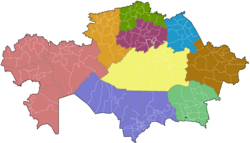History
As in the rest of Central Asia, in ancient times there were communities of the Church of the East in what today is Kazakhstan. [5] These communities were long extinct by the time the modern history of Orthodoxy started in Kazakhstan with the expansion of the Russian Empire into the region.
In the 1871 the Russian Orthodox Most Holy Synod founded the Eparchy of Turkestan [6] to care for all Orthodox Christians in Russian Central Asia, but this was later divided into smaller dioceses.
In June 1945 the Russian Orthodox Church created the Eparchy of Almaty and Kazakhstan to care for Orthodox Christians in Kazakhstan. The decades following this saw the Soviet Union and political control of all religious groups.
Following the collapse of the USSR in 1991, the Russian Orthodox Church in Kazakhstan was reorganized into three eparchies - of Almaty and Semey, Shymkent and Akmola, and Oral and Guryevskiy. In 2003 these three eparchies were united as an ecclesiastical province, with the seat of the Almaty Eparchy being transferred to Astana (formerly Akmola) following its designation as the capital of Kazakhstan. In October 2010 three more eparchies - of Karaganda, Kostanay, and Pavlodar - were created in Kazakhstan and the Archbishop of Astana and Almaty was elevated to the rank of metropolitan archbishop with the title 'Metropolitan of Astana and Kazakhstan.'
In 2011 three more eparchies - of Kokshetau, Petropavl, and Oskemen - were founded. Although not autonomous or self-governing, the Orthodox Church in Kazakhstan has its own statute approved by the Russian Orthodox Holy Synod and is responsible for coordinating the educational programs, publishing work, social outreach, and missionary efforts of Orthodoxy in Kazakhstan.
This page is based on this
Wikipedia article Text is available under the
CC BY-SA 4.0 license; additional terms may apply.
Images, videos and audio are available under their respective licenses.


